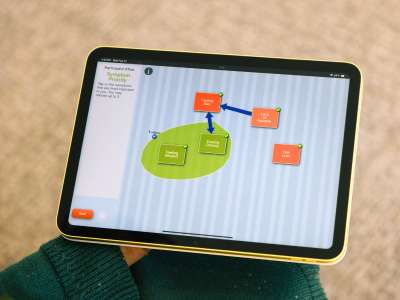Nursing oncology research award leads to NCI grant
April 16, 2024

Suzanne Ameringer, Ph.D., associate dean for academic affairs at the School of Nursing, and her team developed and have been working on the Computer Symptom Capture Tool (C-SCAT) for the past decade. Last year, they were awarded $2.4 million from the National Cancer Institute to conduct a multi-site trial.
Ameringer’s research team consists of scientists from across the country including Children’s Mercy Hospital in Kansas City, University of Utah, and Seattle Children’s Hospital.
“This was the last piece of the puzzle we needed before we could move forward with conducting a randomized controlled trial,” said Ameringer, who was honored as the inaugural recipient of the Tina L. Bachas Oncology Nursing Research Award in 2019. “We had a fantastic score on the grant, but it’s thanks to the Bachas Award that helped position us for the NCI funding.”
The Bachas Award funded the third study of Ameringer’s research, the usability study, which allowed them to evaluate the usability of the C-SCAT using an iterative design with its intended audience and receive feedback. The feedback was then taken to the development and technology team at University of Utah for refinements.
The award fund was established by Tina Bachas, who began her nursing career on the MCV Campus in the late 1960s, and soon met Walter Lawrence, M.D., a new MCV surgical oncologist at the time who became a trusted colleague, supportive mentor and dear friend. Inspired by the late Dr. Lawrence’s role as the founding director of the VCU Massey Comprehensive Cancer Center and his lasting impact, Bachas and her husband Warren Fry created this fund to support the future of nursing oncology research.
The early level commitment from the Bachas Award has really helped us advance this research and is already making a difference...
Suzanne Ameringer, Ph.D.
“One of the big challenges for any researcher is getting started, and until they establish their reputation, they’re not eligible for the larger NIH or NCI grants,” said Bachas, who was instrumental in establishing the in-patient and out-patient medical oncology service line on the MCV Campus that eventually helped Massey receive its initial NCI designation in 1974. “So that’s what’s so important about startup money and the thinking behind my initiative.”
Now, Bachas’ continuing dedication to the oncology field is supporting researchers like Ameringer, who are working to improve how cancer treatment is managed. Ameringer’s research focuses on improving self-management of symptoms among people ages 15 to 29.
The tool works by equipping adolescents and young adults with an iPad survey that lists the 32 most common cancer-related symptoms. These young patients create a graphical image of the symptoms they experienced during the past week, designating relationships among symptoms and identifying their priority symptoms.
“Often adolescents and young adults are not really prepared to discuss their symptoms when they see their providers,” said Ameringer, who holds the Florence E. Elliott Professorship at the School of Nursing. “Developmentally, they often want to ignore their cancer symptoms so when providers ask them about their symptoms, they say they haven’t thought about it. Completed just prior to a provider visit, the tool allows them time to reflect on their symptoms, and often is the vehicle to address an issue they might not otherwise want to verbalize.”

An iPad survey-based tool will allow adolescents and young adults to increase their confidence in managing their cancer symptoms and help them better communicate concerns with their providers. (Photo credit: Daniel Sangjib Min, MCV Foundation)
Symptoms can vary depending on treatment and the type of cancer, but many do overlap and oftentimes providers focus on the ones they perceive as important. With the data from this tool, providers receive a personalized image from each patient, which allows physicians to provide a more personalized approach to the weekly care and treatment plan.
The C-SCAT is already proving beneficial by helping improve communication between adolescents and young adults and their providers, and now with the new grant, the hope is to implement it within health care systems and clinics around the country while not losing site of the primary goal.
“We’re truly thankful to Tina and her husband,” Ameringer said. “The early level commitment from the Bachas Award has really helped us advance this research and is already making a difference by ensuring care providers are equipped to understand the voices and needs of younger patient populations.”
If you would like to support research at the VCU School of Nursing, contact Jess Sorensen, director of development, at (804) 615-5877 or jlsorensen@vcu.edu.